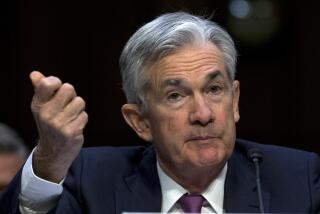Fed Chief Denies Rift With Brady Over Dollar Policy
WASHINGTON — Federal Reserve Board Chairman Alan Greenspan on Wednesday denied that he is at odds with Treasury Secretary Nicholas F. Brady over Bush Administration efforts to keep the dollar from rising.
Greenspan, appearing before a House subcommittee, described the differences between the Fed and the Administration over monetary policy and currency market intervention as “relatively minor issues of tactics. . . . To say there are problems in this area is just wrong.”
Despite Greenspan’s denial, Administration and Fed officials have acknowledged ongoing tensions, with the Treasury Department repeatedly pressing the Fed privately to lower interest rates to help keep the value of the dollar down.
Fed officials, however, have challenged the Administration’s emphasis on holding down the dollar in an effort to narrow the trade deficit, arguing that the Fed’s primary mission should be to keep inflation under control.
By lowering interest rates, the Fed could help keep the dollar from rising by making U.S. securities less attractive compared to foreign investments, which carries the risk of adding to inflationary pressures in the American economy.
Indeed, the Fed revealed earlier this month that two of its top officials who normally have been Administration allies voted to oppose the Treasury’s efforts to sell dollars to drive down the value of the greenback in currency markets.
The officials--Fed Vice Chairman Manuel H. Johnson and Fed Governor Wayne Angell--both voted against raising the Fed’s ceiling on sales of dollars abroad at a monetary policy meeting in September.
The level of dollar sales is on the rise. Greenspan, in replying to a question from Rep. Peter Hoagland (D-Neb.), told the domestic monetary policy subcommittee of the House Banking, Finance and Urban Affairs Committee that the combined holdings of foreign currencies by the Fed and the Treasury currently exceed $30 billion.
Greenspan said differences over economic policy between the Administration and the Fed and inside each institution are normal and contribute to the development of generally correct policies.
The Fed chairman was on Capitol Hill to endorse an apparently quixotic effort by Rep. Stephen Neal (D-N.C.), chairman of the House subcommittee, to win congressional approval of a resolution calling for the Fed to achieve zero inflation within five years.
At the same time, Greenspan vigorously opposed a competing bill sponsored by Democratic Reps. Lee Hamilton of Indiana and Byron Dorgan of North Dakota designed to rein in some of the Fed’s independence.
Neither proposal is expected to make much headway in Congress.
Greenspan, who repeatedly has stated his support for eliminating inflation at some point in the future, called Neal’s proposal “laudable.” He said it would be helpful to receive advice from Congress that “directs monetary policy toward a single goal--price stability.”
But no matter how desirable it might be to achieve the goal of eliminating inflation, Greenspan acknowledged that any such effort would have costs. “During this transition period, growth could be reduced for awhile from what it otherwise would be,” he said.
Moreover, while nearly all economists agree with Greenspan that keeping inflation under control is necessary to promote maximum long-term economic growth, it is doubtful that the resolution itself would accomplish much toward that goal.
The proposal resembles similar efforts--such as the 1985 Gramm-Rudman law declaring the goal of a balanced budget and the 1978 Humphrey-Hawkins Act calling for full employment--that represent little more than Congress’ good intentions.
While Neal’s proposal would provide backing for the Fed’s current goals, the competing Hamilton-Dorgan plan is aimed at opening up the central bank to greater public scrutiny.
Reflecting the traditional Midwestern populist suspicion that the independent Fed is an ally of Wall Street and an enemy of Main Street, the Hamilton-Dorgan legislation would require the central bank to consult more closely with the White House, disclose its decisions more promptly and open itself to audits of its policy moves by the General Accounting Office.
Greenspan attacked each of its provisions as an unnecessary threat to the Fed’s flexibility and independence. “This independence,” Greenspan said, “enables the central bank to resist short-term inflationary biases that might be inherent in some aspects of the political process.”
More to Read
Get the L.A. Times Politics newsletter
Deeply reported insights into legislation, politics and policy from Sacramento, Washington and beyond. In your inbox three times per week.
You may occasionally receive promotional content from the Los Angeles Times.










